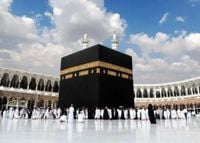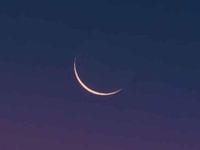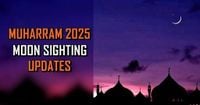The Islamic New Year, marking the start of the year 1447 in the Hijri calendar, officially began on the evening of Wednesday, June 25, 2025, following the sighting of the crescent moon in Saudi Arabia. This celestial event signals the end of the month of Dhul Hijjah, which lasted 29 days this year, and ushers in Muharram, the first month of the Islamic lunar calendar.
Across the Muslim world, this momentous occasion commemorates the historic Hijrah, the migration of the Prophet Muhammad from Mecca to Medina in 622 CE. This migration not only marks the beginning of the Islamic calendar but also symbolizes the foundation of a unified Muslim community and the early establishment of Islamic society and law. Though the Islamic New Year is not celebrated with the grandeur of Eid Al Fitr or Eid Al Adha, it is a deeply spiritual time for reflection, prayer, and renewal of faith.
Saudi Arabia and several Gulf countries, including the United Arab Emirates (UAE), confirmed the moon sighting on Wednesday evening after Maghrib prayers. The UAE has declared Friday, June 27, 2025, a public holiday for both public and private sectors, allowing residents to observe the sacred occasion. In fact, some private sector employees who enjoy weekends on Saturdays and Sundays will benefit from a three-day weekend stretching from June 27 to June 29, with regular working hours resuming on Monday, June 30.
Religious authorities in Saudi Arabia also announced that the Day of Ashura, observed on the 10th of Muharram, will fall on July 5, 2025. Ashura holds profound religious significance as a day of fasting and remembrance within the Islamic tradition.
In Pakistan, anticipation is high as the Central Ruet-e-Hilal Committee prepared to sight the Muharram crescent moon on Thursday, June 26, 2025. The key meeting to confirm the moon sighting was scheduled after Asr prayers at the Deputy Commissioner's Office on Sariyab Road in Quetta, presided over by Syed Muhammad Abdul Khabir Azad, Chairman of the Central Ruet-e-Hilal Committee. Similar zonal meetings were planned simultaneously in provincial capitals, including Islamabad. If the crescent moon is sighted as expected, Pakistan will mark the beginning of the Islamic year 1447 Hijri on Friday, June 27, 2025, with Youm-e-Ashura observed on July 7, 2025.
The Islamic calendar, or Hijri calendar, is strictly lunar, based on the phases of the moon. This lunar system causes Islamic months and holidays to shift approximately 10 to 12 days earlier each year in the Gregorian calendar. Consequently, the Islamic New Year does not fall on a fixed date annually, but rather depends on the moon's visibility.
Muharram itself is one of the four sacred months in Islam during which warfare is prohibited. This sacred status encourages Muslims worldwide to engage in increased prayer, charity, and spiritual reflection. Muharram serves as a time to renew religious intentions and seek forgiveness, emphasizing peace and devotion.
More than 20 countries, including the UAE, Morocco, and Syria, officially recognize the Hijri New Year as a national holiday, underscoring its cultural and religious significance across the Muslim world. In Morocco, while the day is a public holiday, it is generally observed with less fanfare compared to other Islamic celebrations like Eid Al Fitr and Eid Al Adha. Astronomers in Morocco expect the crescent moon to be sighted on June 26, with the new year commencing on June 27.
The arrival of the new Islamic year is also marked by traditional religious and cultural events throughout the Arab world. In Saudi Arabia, the ceremonial replacement of the Kiswa—the cloth covering the Kaaba in Mecca—began alongside the new year festivities, symbolizing renewal and reverence for Islam’s holiest site. Similar observances took place in the UAE, Qatar, and other Gulf nations.
This year’s Hijri New Year follows the recent Eid Al Adha holidays, providing a continuous period of spiritual observance and public holidays for many Muslims in the region. The public holiday in the UAE, for instance, is aligned with these traditions, offering a moment for both personal reflection and communal celebration.
With the crescent moon sighted on June 25 in Saudi Arabia and expected on June 26 in Pakistan and Morocco, the Islamic world is unified in welcoming the year 1447 AH. The occasion serves as a reminder of the historical and spiritual journey of Islam, inviting believers to embrace peace, reflection, and renewed faith as they enter a new chapter in the lunar calendar.






